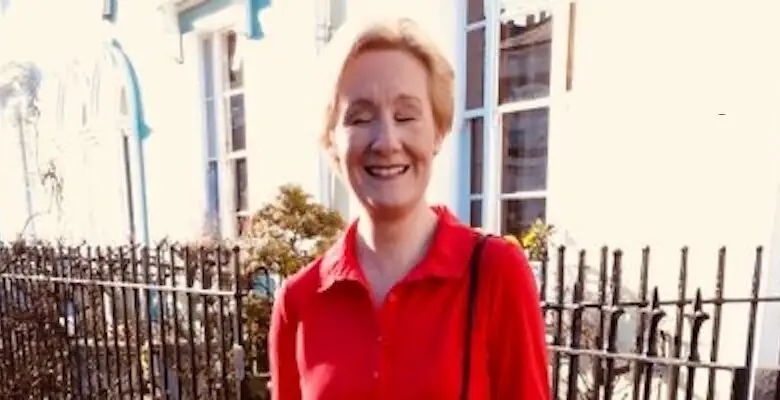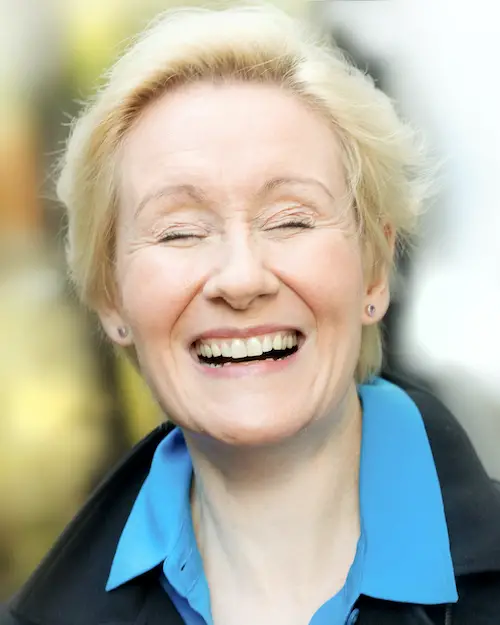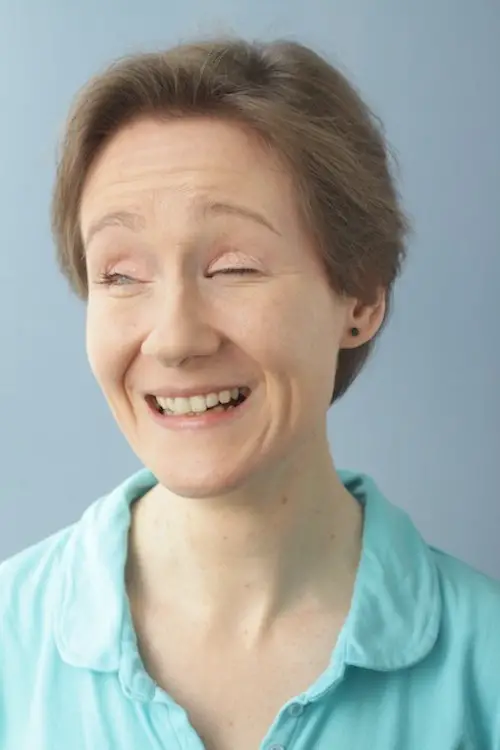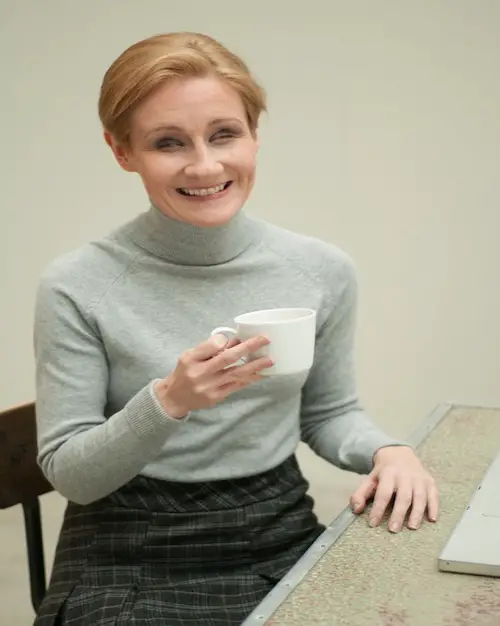
Anna Cannings: blind actress who stars in BBC crime drama Strike
Anna Cannings is a blind actress from Sussex, best known for her appearance as Della Winn in the BBC crime drama Strike. She was born totally blind and has a career in acting, speaking and modelling that spans more than 20 years.
Our writer, Emma Purcell, interviewed Anna about what life is like as a totally blind person and her career as an actress, voice artist, model and motivational speaker.
Anna was born blind with a rare eye condition called Bilateral Microphthalmia – bilateral meaning both eyes and Microphthalmia meaning abnormally small eyes.
She was the first totally blind child in Sussex to attend mainstream school and was introduced to the media industry after starring in an RNIB short documentary aged nine.
As well as her appearance in Strike, Anna has had guest roles in ITV’s comedy-drama William and Mary and BBC medical drama Bodies. She has also featured in the BBC’s 2015 New Year’s day drama, Esio Trot.
In addition, Anna was cast in Sam Washington’s commercial See and made a contribution in the Listerine doc-ad Feel Every Smile.
Anna is also an established braille voice artist, in which she can read aloud braille as quickly, accurately and fluently as a sighted person reads print.
She has done voice work with many well-known companies, brands and organisations, including Tate Modern, Marks and Spencer, BT, University of Birmingham, Talking Newspaper Association, RNIB and many more.
Furthermore, Anna has done modelling work for sculptor Marc Quinn, photographer Julia Fullerton-Batten and popular publications, including National Geographic, Which?, Now Magazine and M Magazine (in association with the Daily Mirror).
Read on to find out more about Anna Cannings in her own words.


Anna Cannings living as a totally blind person
What was it like growing up as a blind child and what kind of support did you receive at mainstream school?
It was tough at times, but interesting. I had a range of support staff and specialist equipment, such as Perkins Braillers and later computers with screen readers, at all of the three schools I attended.
I went to a Christian primary school and was fully accepted there. But integration was much harder in my teenage years when I struggled with some of the subjects, such as PE and maths. I also found it more difficult to make friends.
My last school was a crowded, hectic place and spread across two sites. It made getting around independently much more difficult, which impacted negatively on my travel confidence for some time.
What kind of adaptations or support do you use on a daily basis and how did you learn the skills to be a “braille voice artist”?
I have both a Braille embosser and portable Braille display. I also use screen readers on my laptop and phone. I use a white cane to assist with mobility.
I loved Braille from the second I discovered it, so I’m not surprised that it’s become a major part of my adult life.
My passion for reading and writing has always been immense, and I don’t remember ever struggling to learn Braille as I know so many people do.
Regular exposure to it and appreciation of it is what has made me so quick and fluent at reading it – something I’m immensely grateful for.
What is the most challenging thing about being blind?
Dealing with the frustration of really wanting to go somewhere and not being able to get there independently, without mobility training and/or practise trips with sighted people beforehand.
Even if you order a taxi, you never know exactly where it’s going to drop you and if you will be able to locate the building easily – a problem that’s been amplified by the new complications of social distancing.
Anna Cannings becoming an actress


Your media experience began as a child when you featured in an RNIB video, Anna’s Story. How did you get involved with the RNIB and be offered to film the short documentary?
The opportunity to film Anna’s Story came through the BBC’s disability correspondent, Peter White, rather than through RNIB.
My mum had been on Peter’s Radio 4 In Touch programme after I was born, talking about people’s attitudes towards blindness. Peter’s researchers contacted my mum when the charity was looking for a blind child in the late stages of integrated primary education.
Integration was fairly unusual back then, so it was a great opportunity to highlight the benefits and challenges of such an approach and taking part certainly gave me the media bug.
How did you get involved in The Actors Centre in London and what kind of training did you undertake?
The Actors Centre was recommended to me by TV director Matthew Evans, who I worked with in the very early stages of my acting career. I did a wide range of short courses there, including casting workshops, accent and dialect coaching and singing lessons.
Not coming from a formal acting background, it was a great way to acquire some extra skills and knowledge. After studying there, I didn’t feel quite so out of my depth.
Which acting roles have you enjoyed over the past 20 years and have any of your roles been non-disabled?
No non-disabled roles, sadly, but they’ve all been great fun in different ways and have, I hope, all increased understanding of blindness.
My favourite role was my most recent, as Della Winn in Strike. I would love to see more incidental castings where a character just happens to be blind, but I think this is still some way off. That said, storylines around blindness are becoming more rounded and less about the disability.
Anna Cannings performing in BBC crime drama Strike
How did you get the role of Della Winn in Strike and do you think blindness has been portrayed well in your character?
My agent was contacted to see if I was available for the filming dates. I submitted a self-tape, went in for a short face-to-face audition, and got the part – it all happened unusually quickly.
The director, Sue Tully, was very committed to authenticity for the character and I think that makes all the difference.
Della Winn is a strong, professional woman, and it was a wonderful opportunity to portray someone so capable and determined.
What kind of reaction has your character had from viewers?
A good one, I think. My website received a lot of views after it was broadcast, and I think a few articles appeared online.
Inclusion of fully blind actors who look visibly different, as I do, is still quite rare. For us to be portraying capable, independent characters is even rarer. So, if it generates interest and questions, then I think that’s a great thing.
Have you got any future film or TV roles lined up?
I’ve no idea what’s happening with work at the moment. The industry is still largely closed, and social distancing measures will present huge challenges for me in the workplace.
I can only hope that these will ease, or that employers will make reasonable adjustments if they hire us. But I fear that Covid will become yet another invisible barrier for disabled performers.
Anna Cannings working as a voice artist, model and motivational speaker
How did you first get into working as a voice artist and what kind of jobs have you done?
I’ve always loved radio and won a competition for a young presenter of the year at a radio station in Sussex when I was still at school.
When I left school at 16, I did some voluntary work with Talking Newspapers, before setting up a small audio production company, which predominantly produced audio versions of print publications.
I produced recordings mainly for national charities, universities, colleges and leisure providers.
More recently, I’ve done work for Orion audiobooks and Tate Modern, and my voice skills usually play a major part in my acting roles, even when there are visuals to accompany the sound.
As a model, you’ve been involved in many high-profile publications and campaigns. Which one(s) has been your favourite and why?
The Marc Quinn sculpture Anna Cannings: Blind from Birth is probably my favourite modelling job, simply because it’s the most unusual one I’ve ever done.
But they have all, I hope, in some small way, served to increase people’s understanding of blindness – helped people to see it as a normal part of everyday life.
Advertising and articles rarely get portrayal completely right – I’ve had to just learn to live with that – but they do reach lots of people, and that can only be a good thing.
As a motivational speaker, what has been the strangest or unusual question you’ve been asked?


I laughed and told him truthfully that I don’t know, but that it doesn’t really matter all that much and so I never worry about it. It was such a sweet interaction!
What advice would you give to other disabled people wanting to become an actor, voice artist or model?
Absolutely go for it! But be very clear in your heart as to what you are comfortable about doing and always have the courage to turn down a job, or ask for modifications to a role, if you are in any way uncomfortable with what is being asked of you as a performer.
For example, if you feel that your disability is being used to promote or portray something that feels unethical, misguided or disingenuous, walk away.
There are a lot of different agendas competing within any creative process and it’s taken me a long time to learn how and when to speak up – to recognise and value the fact that my opinion as a disabled performer is just as valid as that of any executive.
To find out more about Anna Cannings and her career, visit her website and follow her on Twitter.
Inteview by Emma Purcell – follow her blog Rock For Disability
More on Disability Horizons…